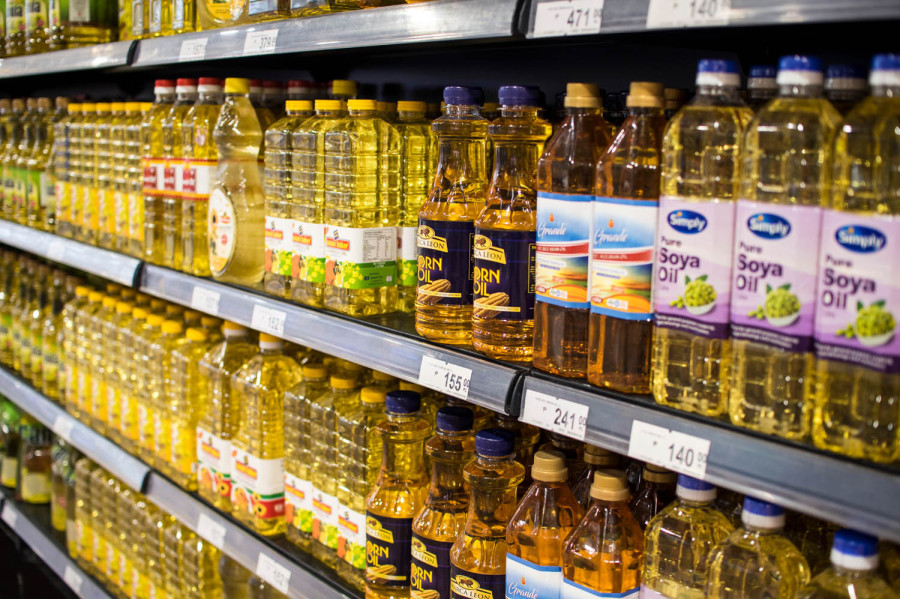Money
An astronomical jump in Nepal’s soyabean oil exports baffles experts
Nepal, India source crude edible oil from same suppliers, raising concerns over tariff-driven trade manipulation.
Krishana Prasain
Nepal’s soyabean oil exports to India have seen an astonishing 45-fold increase in the first half of the current fiscal year, even though Nepal produces very little soyabean itself.
Experts say the dramatic rise is driven by traders cashing in on tariff loopholes in neighbouring India, a recurring pattern in Nepal’s trade.
According to the Department of Customs, soyabean oil exports soared to Rs18.91 billion in the first six months of the fiscal year, up from Rs415.19 million in the same period last year.
Meanwhile, Nepal’s crude soyabean oil imports more than doubled to Rs24.37 billion.
Nepal imported 169,953 tonnes of crude soyabean oil and exported 90,983 tonnes of processed soyabean oil to India. The crude oil was sourced from Argentina, Benin, Brazil, Paraguay, Thailand, Togo, and Ukraine. Nepal refines the crude oil domestically before exporting it to India.
Despite this booming trade, Nepal’s domestic production of raw soyabean remains minimal at just 31,567 tonnes annually—insufficient to meet even a fraction of local demand.
The trend of exporting large volumes of edible oils to India began in 2018-19.
In that year, Nepal imported crude soybean oil worth Rs13.43 billion and exported Rs2.34 billion of processed oil.
In 2019-20, imports jumped to Rs18.72 billion, and exports reached Rs12.69 billion. This trend peaked in 2021-22 when imports hit a record Rs56.18 billion and exports reached Rs48.12 billion.
India’s Embassy in Kathmandu had raised concerns over tariff skirting through rerouted exports before India adjusted its tariff policies in late 2021.
A report of the International Food Policy Research Institute (IFPRI) says India reduced duties on major crude edible oils, including soyabean, to zero in September 2021.
Then India moved to cut tariffs on refined edible oils—palm oil to 12.5 percent and soybean and sunflower oils to 17.5 percent. These reductions, set to last until March 2024, initially led to a 62 percent decline in exports of Nepal’s overall edible oil, including palm oil, to India.
The adjustments led to a sharp dip in Nepal’s soybean oil exports, which fell to Rs8.47 billion in 2022-23 from Rs48.12 billion in 2021-22. Imports also dropped to Rs35.58 billion during the same period.
“Interestingly, when examining the import profiles of both countries, it becomes clear that they share the same major suppliers of crude edible oil. Nepal imposes lower tariffs on major edible oils compared to India, with duty differentials ranging from 22.5 percent to 30 percent in 2021,” according to the report by IFPRI.
There has been a resurgence in the soyabean oil trade, which has helped improve Nepal’s overall trade.
The trend reversed again in September last year when India reinstated a 20 percent basic customs duty on crude and refined edible oils to protect domestic farmers from falling oilseed prices. As a result, Nepali traders resumed their business, taking advantage of the tariff differential.
“The policy-induced tariff wedge has returned,” said Nara Bahadur Thapa, a former Nepal Rastra Bank executive director. “This trade benefits Nepal in terms of revenue, but arbitrage-driven trade is neither sustainable nor good for long-term economic stability.”
Under SAFTA and the India-Nepal Trade Treaty, Nepali exports to India enjoy zero-duty benefits.
By contrast, countries outside South Asia face a 45 percent tariff on soyabean oil exports to India.
This creates a significant price gap between imported and domestically produced goods, incentivising traders to reroute edible oils through Nepal for duty-free entry into India.
The IFPRI has suggested that such policy instability can have far-reaching negative consequences on trade partners, especially within preferential trading arrangements.
A stable trade policy reduces risk and volatility and enables long-term trade engagements.
Nepal’s rising foreign currency reserves, mainly driven by remittances, have enabled the purchase of crude oil for export. However, Thapa warns that using reserves for such arbitrage-driven trade does little to enhance Nepal’s long-term economic growth or employment generation.
“Policymakers need to analyse this type of trade differently. It does not contribute to sustainable economic development,” Thapa said.
“Should India lower import tariffs again, the trade is expected to decline sharply, as seen in the past with vegetable ghee and palm oil.”
Nepali traders continue to profit from tariff differentials, even as experts and policymakers question the long-term viability of such trade practices.




 13.12°C Kathmandu
13.12°C Kathmandu













